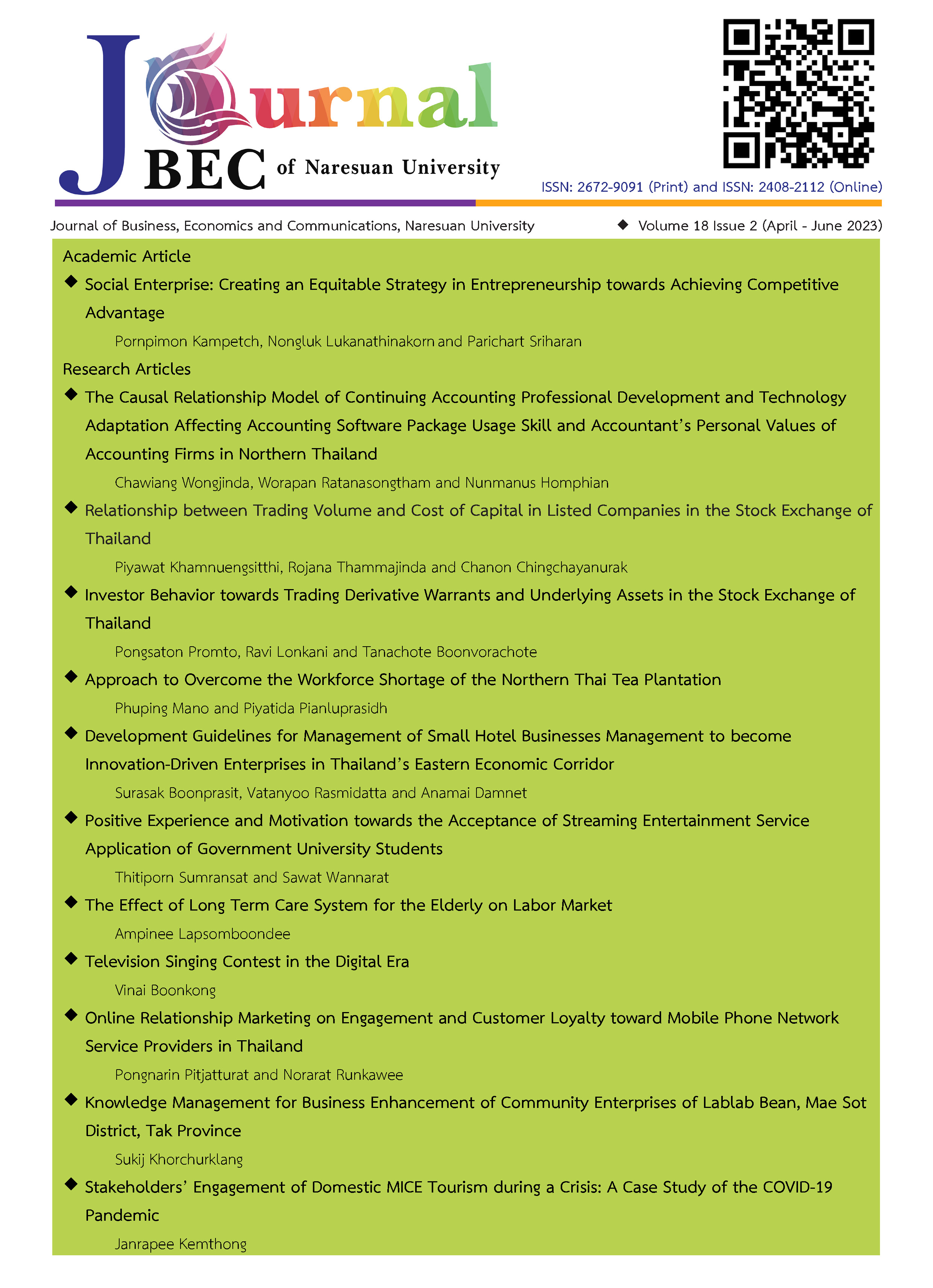The Causal Relationship Model of Continuing Accounting Professional Development and Technology Adaptation Affecting Accounting Software Package Usage Skill and Accountant’s Personal Values of Accounting Firms in Northern Thailand
Main Article Content
บทคัดย่อ
This research aims to investigate the causal relationship model of continuing accounting professional development and technology adaptation affecting accounting software package usage skill and accountant’s personal values, by using a questionnaire as an instrument for collecting data from 385 accountants of accounting firms in Northern Thailand. All composite reliability values ranged from 0.939 to 0.955. The data was analyzed by SEM using Lisrel. The results show that technology adaptation was the most influential factor directly on the accounting software package usage skills and indirectly on the personal values, with the mediator being accounting software package usage skill. The results also show that the measurement model was in congruence with the empirical data (χ2 = 145.075, p-value = 0.506, df= 146 (χ2/df = 0.993), RMSEA = 0.000, GFI = 0.962, AGFI = 0.954, NFI = 0.968, NNFI = 0.995). This model exhibits goodness of fit.
Article Details

อนุญาตภายใต้เงื่อนไข Creative Commons Attribution-NonCommercial-NoDerivatives 4.0 International License.
เอกสารอ้างอิง
Aaker, D. A., Kumar, V. and Day, G. S. (2001). Marketing Research. (7th ed.). New York: John Wiley and Son.
Alsabahi, M. A., Bahador, K. M. K. and Saat, R. M. (2020). IT competency in accounting: A conceptual study. International Journal of Business and Technopreneurship, 10(1), 51-56.
Barclay, D., Higgins, C. and Thompson, R. (1995). The partial least squares (PLS) approach to causal modeling: Personal computer adoption and use as an illustration. Technology studies, 2(2), 285-309.
Chairat, R. (2020). The Role of the Future Accountant: Accountant to Accounting Innovator. Bangkok: Thailand Federation of Accounting Professions.
Choi, J. H., Kim, C. F., Kim, J. B. and Zang, Y. (2010).Audit office size, audit quality, and audit pricing. Auditing: A Journal of Practice and Theory, 29(1), 73-97.
Chow, W. S. and Chan, L. S. (2008). Social network, social trust and shared goals in organizational knowledge sharing. Information and Management, 45(7), 458-462.
Department of Business Development. (2020). DBD Data Warehouse. Retrieved September 10, 2020, from https://datawarehouse.dbd.go.th/searchJuristicInfo/
Frijat, A. L. and Saleh, Y. (2020). Compliance with Continuing Professional Development (IES7) of Internal Auditor and Quality of Internal Audit Function. Accounting and Finance Research, 9(1), 28-44.
Fornell, C. and Larcker, D. F. (1981). Evaluating structural equation models with unobservable variables and measurement error. Journal of Market Research, 18(1), 39-50.
Hair, J. F., Black, W. C., Babin, B. J. and Anderson, R. E. (2010). Multivariate data analysis: A global perspective. (7th ed.). New Jersey: Pearson Education.
Kaneko, P. and Yimruan, S. (2018). Thai accountant competencies, accounting experience, accountability attitude, andadaptation capabilities, on success in accounting profession after asean economic community. Asian Administration and Management Review, 1(1), 115-122.
Jaiyen, P., Maneechai, K., Khruengthi, T. and Boonbhap, N. (2017). Accountants with modern technology. Journal of Pacific Institute of Management Science, 3(1), 196-207.
Kapardis, M. K. and Zopiatis, A. (2011). Personal values of accountants and accounting trainees in Cyprus. Business Ethics: A European Review, 20(1), 59-70.
Komalasari, S. P., Febrianto, R., Wati, Y. and Odang, N. K. (2018).The influence of personal value, moral philosophy, and organizational ethical culture on auditor action and acceptance for dysfunctional behavior. International Journal of Progressive Sciences and Technologies, 10(2), 262-273.
Laonamtha, U. and Laohamethanee, W. (2014). A confirmatory study of thai accounting students’ personal value case study: Rajamangala University of Technology Lanna and Mahasarakham University. Journal of Behavioral Science, 20(2), 56-75.
Mubako, G., Bagchi, K., Udo, G. and Marinovic, M. (2020). Personal Values and Ethical Behavior in Accounting Students. Journal of Business Ethics, 174, 161-176.
Nunnally, J. C. (1978). Psychometric theory. New York: McGraw-Hill.
Nunnally, J. C. and Bernstein, I. H. (1994). Psychometric Theory. (3rd ed.). New York: McGraw-Hill.
Papadopoulou, M. and Papadopoulou, S. (2020). The accounting profession amidst the COVID-19 pandemic. International Journal of Accounting and Financial Reporting, 10(2), 39-59.
Phyu, K. K. and Vongurai, R. (2020). Effects on adaptation intention towards using accounting software in terms of technology advancement at work in myanmar. Assumption Journals, 12(2), 98-111.
Putra, P. Y. P., Albab, F. N. U. and Swara, C. C. A. (2019).Reflections on individual personal values in the budgetary slack phenomenon. The Indonesian Journal of Accounting Research, 22(1), 105-130.
Schumacker, R. E. and Lomax, R. G. (2010). A beginner’s guide to structural equation modeling. (3rd ed). New Jersey: Routledge/Taylor & Francis Group.
Schwartz, S. H. and Bardi, A. (2001). Value hierarchies across cultures: taking a similarities perspective. Journal of Cross-Cultural Psychology, 32, 268–290.
Sricharumedhiyan, J. and Sricharumedhiyan, C. (2020).The Strategy for Organization Adjustment in 4.0 Era. Journal of Buddhamagga, 5(1), 54-62.
Tanaka. S. and Sithole. M. (2015). Information technology knowledge and skills accounting graduates need. International Journal of Business and Social Science, 6(8), 47-52.
Thailand Federation of Accounting Professions. (2020). Importance of Skill and Technology for Managerial Accountant. Retrieved January 28, 2021, from https://www.tfac.or.th/Article/Detail/123469/
Thottoli. M. M. (2020). Knowledge and Use of Accounting Software: Evidence from Oman. Journal of Industry-University Collaboration, 3(1), 2-14.
Yamane, T. (1973). Statistics: An Introductory Analysis. (3rd ed). New York: Harper and Row.
Soa, N. L. (2018). Teaching IFRS performance in accounting training in universities development opportunities for young lecturers. Educational Research, 9(5), 145-150.
Wells, J. T. (2002). Occupational fraud: the audit as deterrent. Journal of Accountancy, 193(4), 24– 28.
Wongjinda, C. and Ussahawanitchakit, P. (2014). Accounting expertise orientation and professional survival: evidence from Bookkeepers in the Northeastern of Thailand. Review of Business Research, 14(2), 11-26.


